Alabama’s HERObike workshop aims to use bamboo to save a local economy
Greensboro, Ala., the once-thriving “Catfish Capital” of the southern state, has struggled financially in recent years. More than 25 percent of the city’s population lives below the poverty line and new work is hard to come by. On this week’s “TechKnow,” Rachelle Oldmixon travels to Greensboro to learn about one organization’s mission to restore the city’s jobs and economy—and the innovative new product helping them achieve those goals.
When clothing designer and product developer Pam Dorr came to Greensboro in 2003, about 75 percent of the city’s retail shops had shut down. An architectural fellowship had lead her to rural Alabama and after witnessing the need first-hand, she helped to create the Housing Resource Center branch of the Hale Empowerment and Resource Organization (HERO), which she still runs.
HERO is involved in a number of community projects focused on creating jobs, providing housing, and strengthening the economy in the Hale County area. One of their latest ventures is an independent manufacturing shop creating bicycles from one of Greensboro’s most abundant natural nuisances.
“We have a lot of bamboo,” Dorr says with a laugh. “So, if you have a lot of bamboo, you’ve got to have a product you’re making out of it.”
That product is the Semester bike, a bamboo and carbon fiber composite bicycle, manufactured in the HERObike workshop in Greensboro. Bamboo bikes aren’t a new concept, but what makes the Semester bike unique is industrial designer and University of Kansas professor Lance Rake’s vision. Rake and some of his students developed the hybrid structure for the Semester bike, which combines bamboo and carbon fiber.
"I think the most innovative part is actually being able to make a composite, having carbon fiber with the bamboo," Rake explains.
Workers in the HERObike workshop split and sand bamboo, then cut beveled angles on the sides of each piece. Six angled pieces are then fastened with epoxy around carbon fiber tubing to created a hexagonal structure, the proprietary design that HERObikes refers to as a “Hextube.” The inner tubing is then inflated, expanding the carbon fiber to press against the bamboo structure, and the epoxy hardens the bamboo and fiber into lightweight yet sturdy frame.
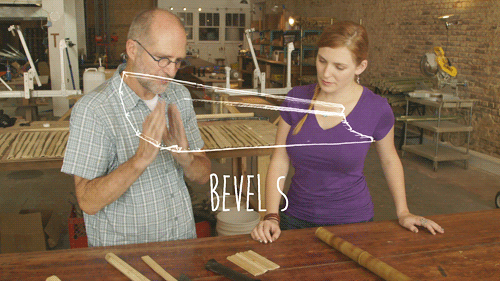
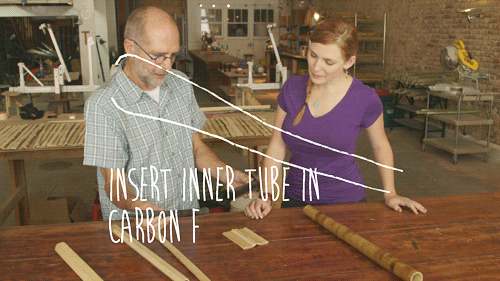
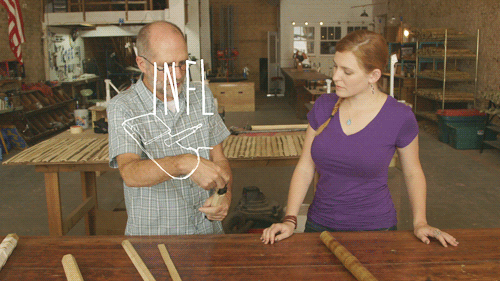
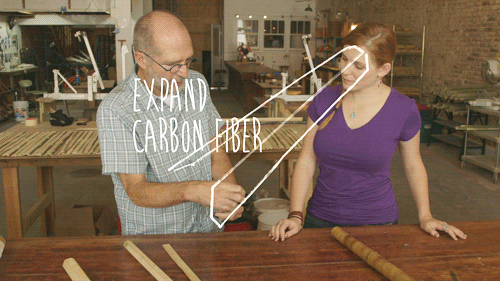
“It’s a very low-tech way to get at a high-tech solution,” Rake says of the structure, and Oldmixon agrees that the bike is “elegant in its simplicity.” The same could be said of HERO’s approach to employment opportunities, both in the bike shop and at their other projects.
“I realized I’m going to probably need people to build these bikes that are not bike builders,” Rake tells Oldmixon. “We’re trying to make jobs that are not a factory so much as a studio.”
Most of the workers at the HERObike workshop didn’t have much experience with bicycles beyond riding them, but all are grateful for the opportunities provided by the organization.
“It was looking pretty rough,” says HERO bike builder Adam Fowler. “This job has given me the opportunity to earn a good living.”
The opportunities and influence provided by HERO in Greensboro can been seen up and down the city’s Main Street, from the HERObike workshop to its neighboring bakery Pie Lab, a community space that provides job training and employment as well as resources for other local entrepreneurs.
“I was on the welfare program and got placed over here,” Pie Lab employee Nikita Pettway tells Oldmixon. “I have a job now. I can pay my bills and take care of my kids.”
Pettway is one of the many Greensboro residents whose life has been touched by HERO projects, and the workers and partners of the organization hope that influence will only continue to grow. Following a successful Kickstarter campaign, HERObike plans to crank up large-scale production of the Semester bike towards the end of 2013. For every 50 bikes that go out, another job opportunity is created.
"What we’d like to do is use what is here to create a better future," Rake says. "The thought of being able to come back here and see this shop filled with people that are making these bikes, how rewarding is that?"
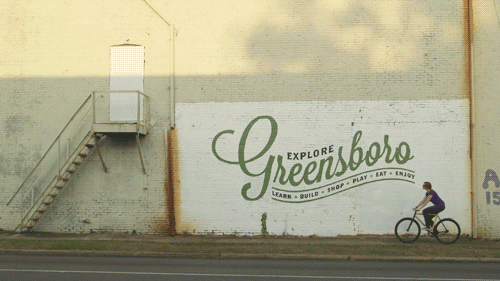
Watch "TechKnow," Sundays at 7:30PM ET/4:30PM PT on Al Jazeera America.
Error
Sorry, your comment was not saved due to a technical problem. Please try again later or using a different browser.